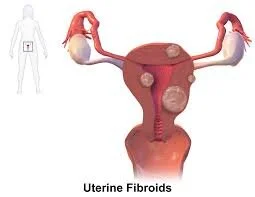The presence of iron deficiency is common in women of child-bearing years due to monthly iron loss with each period. If accompanied by inadequate dietary iron intake, this can progress over time to moderate to severe anemia. Excessive blood loss with menstruation can occur for a variety of reasons, including uterine fibroids (benign tumors of the muscle layer of the uterus).
Uterine fibroids are the most common benign pelvic tumor in women, occurring in up to 70% of women, and are more common and larger in some ethnic groups such as African American women (up to 2-3 times more frequent than white women). In African American women, fibroids frequently lead to more severe symptoms, and often at younger ages. Up to 80% of African American women over 50 years old have fibroids.
After childbearing years, myomectomy (removal of fibroid) and hysterectomy (removal of the uterus) are the most common approaches to excess bleeding due to fibroids. African American women tend to have surgery at a younger age than white or Hispanic women. Heavy and prolonged menses is the typical bleeding pattern with fibroids and, in turn, heavy uterine bleeding may cause iron deficiency anemia.
For women who are not candidates for hysterectomy, options include uterine artery embolization, or “bead” embolization. This approach occludes (closes) the artery, reducing blood flow and shrinking the fibroid. Medical management options include medications, such as oral contraceptives, that indirectly inhibit or reduce production of ovarian hormones, such as estrogen, responsible for activating growth of both the uterine lining as well as uterine fibroids. The decline in the hormonal stimulus results in reduction in recurrent, heavy menses.
Uterine fibroids medical expert witness specialties include gynecology, robotic gynecologic surgery, and anesthesiology.

